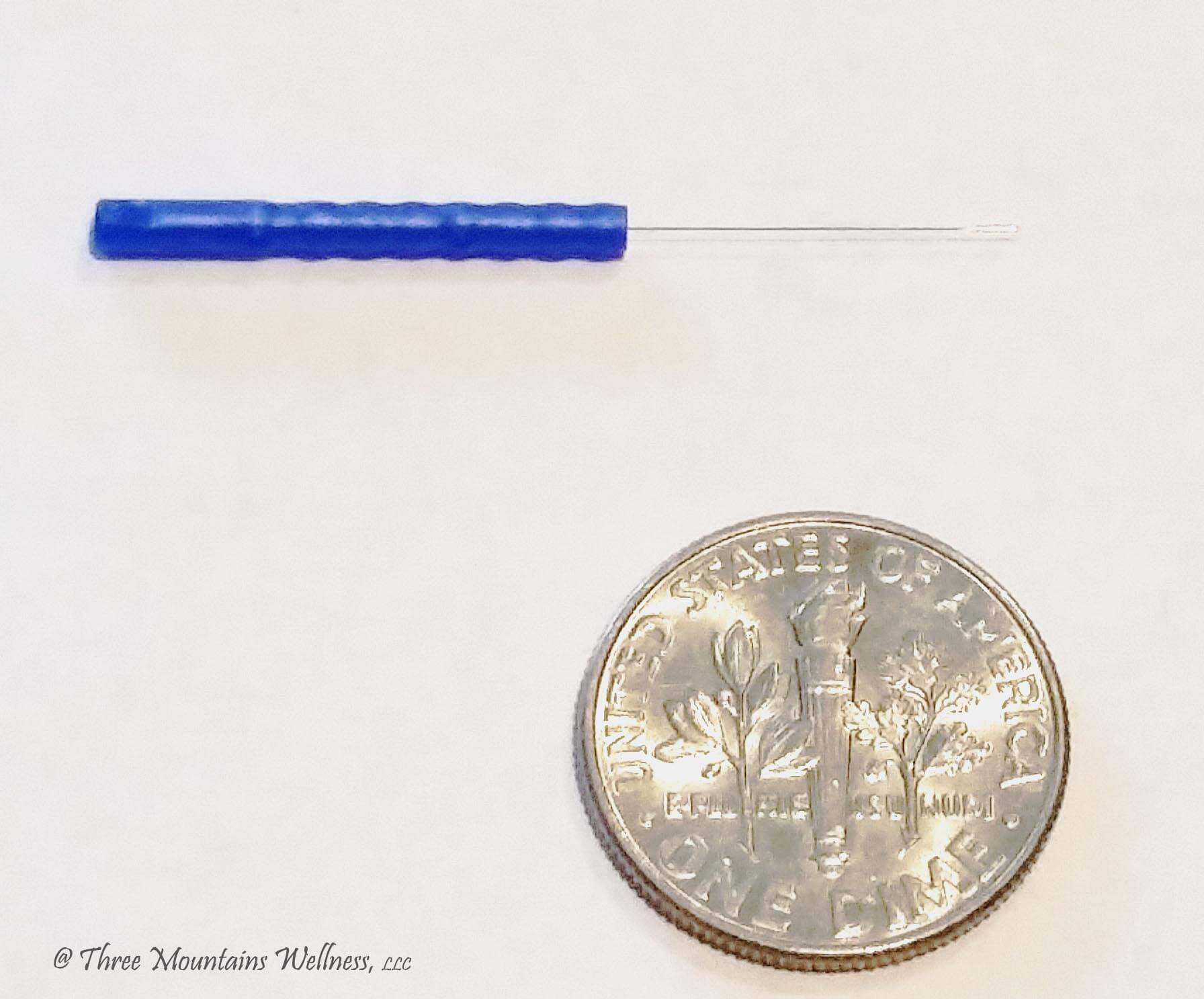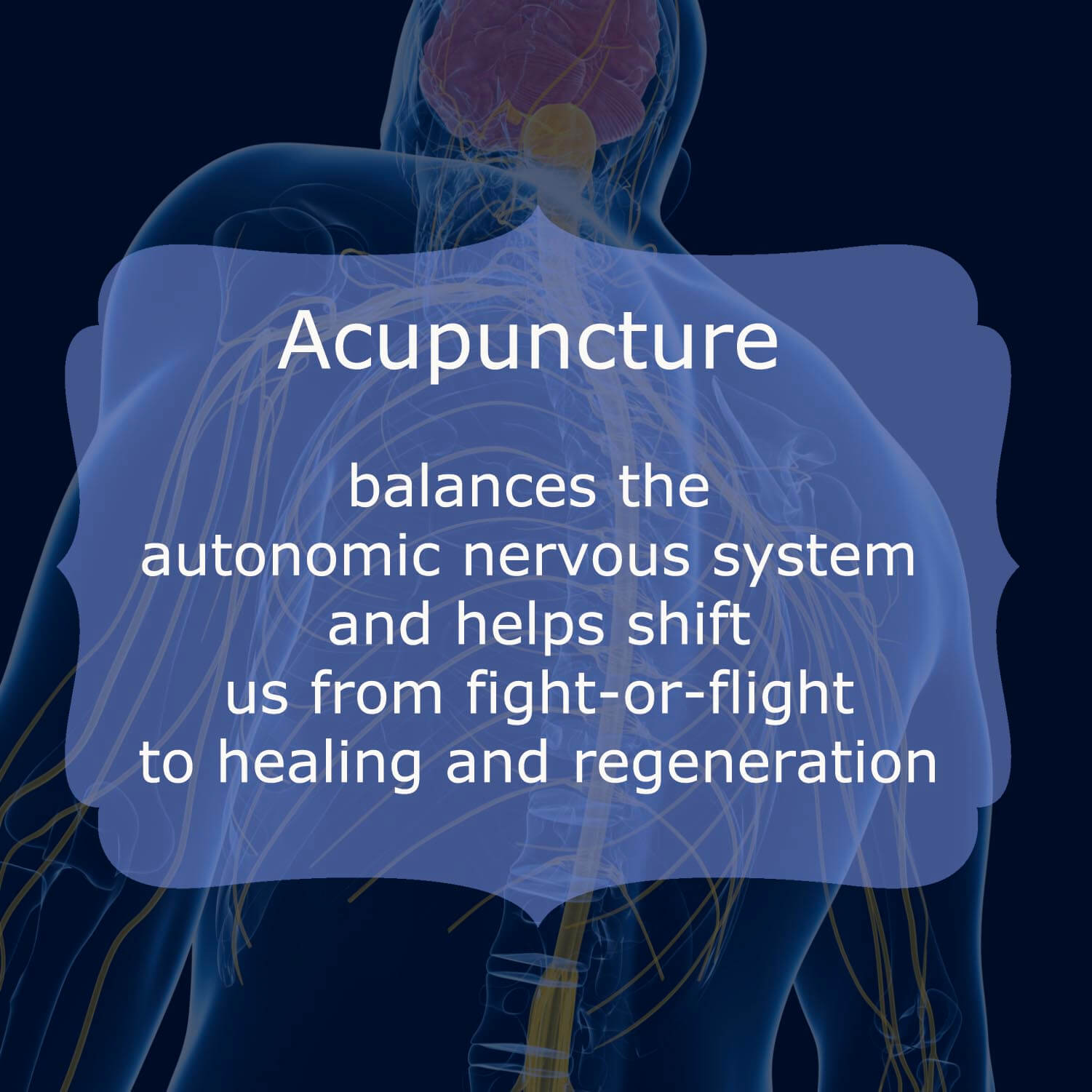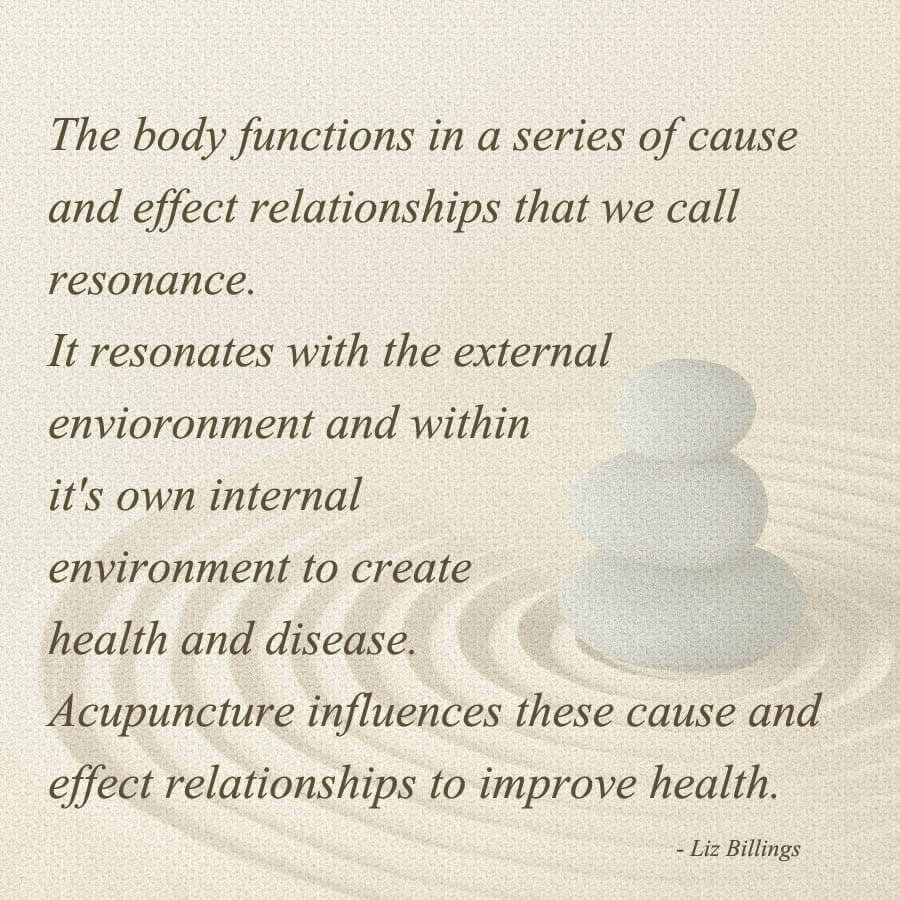Curious About Acupuncture?
You've probably heard people talking about acupuncture. TV news programs discuss the latest research and show people getting acupuncture, doctors at the World Health Organization and the National Institutes of Health recommend it for a variety of conditions and you may have family, friends or colleagues that have regained their health using acupuncture. At Three Mountains Wellness, acupuncture and oriental medicine are used every day to help people feel better. It's not magic, it's an evidence-based system of oriental medicine that's worked for over 5000 years. But what is it, how does it work, and why should you try it? Read on...
What Is Acupuncture?

Acupuncture is the placement of tiny, hair-fine needles at specific points in the body in order to improve physical, mental or emotional health. All needles used at Three Mountains Wellness are sterile, single-use disposable needles. Not a big fan of needles? I'm not either. I wish, as an acupuncturist, that I had a better word to describe the tools that I use. They're nothing like the hypodermic needles that you've experienced at the doctor's office. Acupuncture needles are tiny! They're only a fraction of the size of a hypodermic needle and most people don't even feel them go in. This is a picture of an actual needle just like the ones that will be used to improve your health and wellbeing at Three Mountains Wellness. It's amazingly thin, but it can have powerful results. As an acupuncturist, I've spent years learning proper needle technique to get good results while making your experience as painless as possible. The result, as research repeatedly demonstrates, is that I can stimulate the central nervous system, balance your Qi and activate the brain's healing functions in a gentle, comfortable way. So comfortable in fact, that most people just relax and doze off while the needles do their work.
How Does Acupuncture Work According to Western Medicine?
 Acupuncture does not require a leap of faith. We know that acupuncture is effective for a number of conditions and researchers continue to investigate why it works so well. In doing so they're finding new relationships between the body and the brain and new understandings of how the body works as a whole. There is much to learn about how the human body functions, particularly when dealing with something as complex as the human nervous system. Although Oriental medicine has been practiced for thousands of years, in the west the Nobel Prize in Physiology and Medicine was only awarded to Walter Hess in 1949 for his groundbreaking work in creating the first rudimentary map of the regions of the brain that influence the functions of the internal organs. Even today we still have major western medicine journals, such as Autonomic Neuroscience, that continue his line of inquiry and publish research on such basic topics as what parts of the brain are involved in control of blood pressure and the organization of the sacral nerves that control the bladder and large intestine. Not surprisingly, they also publish research about acupuncture. They've come up with quite a laundry list of the ways that acupuncture influences the body to heal itself. Among these are the fact that acupuncture activates important centers of the brain that control the autonomic nervous system (your body's auto-pilot that theoretically keeps you in balance and healthy) and mediate behavioral and physical responses to stress. These include the hypothalamus, medulla oblongata and dorsomedial prefrontal cortex.
Acupuncture does not require a leap of faith. We know that acupuncture is effective for a number of conditions and researchers continue to investigate why it works so well. In doing so they're finding new relationships between the body and the brain and new understandings of how the body works as a whole. There is much to learn about how the human body functions, particularly when dealing with something as complex as the human nervous system. Although Oriental medicine has been practiced for thousands of years, in the west the Nobel Prize in Physiology and Medicine was only awarded to Walter Hess in 1949 for his groundbreaking work in creating the first rudimentary map of the regions of the brain that influence the functions of the internal organs. Even today we still have major western medicine journals, such as Autonomic Neuroscience, that continue his line of inquiry and publish research on such basic topics as what parts of the brain are involved in control of blood pressure and the organization of the sacral nerves that control the bladder and large intestine. Not surprisingly, they also publish research about acupuncture. They've come up with quite a laundry list of the ways that acupuncture influences the body to heal itself. Among these are the fact that acupuncture activates important centers of the brain that control the autonomic nervous system (your body's auto-pilot that theoretically keeps you in balance and healthy) and mediate behavioral and physical responses to stress. These include the hypothalamus, medulla oblongata and dorsomedial prefrontal cortex.
I think Dr. Hess expressed the role of western research very well in his Nobel Lecture:
"A recognized fact which goes back to the earliest times is that every living organism is not the sum of a multitude of unitary processes, but is, by virtue of interrelationships and of higher and lower levels of control, an unbroken unity. When research, in the efforts of bringing understanding, as a rule examines isolated processes and studies them, these must of necessity be removed from their context. In general, viewed biologically, this experimental separation involves a sacrifice. In fact, quantitative findings of any material and energy changes preserve their full context only through their being seen and understood as parts of a natural order. This implies that the laws ... leading from the part to the whole, represent a biological uncertainty, indeed an uncertainty of the first order. It becomes all the more acute, the more rapidly the advances of specialization develop and threaten the ability to grasp, or even to appreciate it... In particular it deals with the neural mechanisms by which the activity of the internal organs is adapted to constantly changing conditions, and by which they are adjusted to one another, in the sense of interrelated systems of functions. It only remains to be added that broadening of our knowledge in these respects is of benefit not only with regard to the human compulsion to understand, but also to the practical healing art. For man also, in health and sickness, is not just the sum of his organs, but is indeed a human."
How Does Acupuncture Work According to Eastern Medicine?
 Oriental medicine excels in the areas that Dr. Hess argued are the most important in understanding the art of healing. It goes deeper than hierarchy and organization and is more relationship focused. Oriental medicine says that energy is created when organs are working and they communicate with each other through feedback loops that enable us to maintain a healthy, dynamic body. However, our bodies are sometimes exposed to either external or internal pathogens that cause these delicate internal workings to become disrupted. As a result, some systems may become weak or excessively aggressive. If this is not corrected, first internal communication and the mutually supportive and controlling relationships between organs are disrupted, then disease develops. According to the Ling Shu, one of the most important classical acupuncture texts, the proper application of needles unties the knots and washes away the stains that cause poor health and suffering. It's poetic language, but that's also how my patients describe what they feel during an acupuncture treatment. Acupuncture restores the proper internal flow of energy between organs and stimulates a healthy balance and communication. Once that is corrected, poor health is not sustainable and the body tends to return to the dynamic, healthy condition that it was meant to have.
Oriental medicine excels in the areas that Dr. Hess argued are the most important in understanding the art of healing. It goes deeper than hierarchy and organization and is more relationship focused. Oriental medicine says that energy is created when organs are working and they communicate with each other through feedback loops that enable us to maintain a healthy, dynamic body. However, our bodies are sometimes exposed to either external or internal pathogens that cause these delicate internal workings to become disrupted. As a result, some systems may become weak or excessively aggressive. If this is not corrected, first internal communication and the mutually supportive and controlling relationships between organs are disrupted, then disease develops. According to the Ling Shu, one of the most important classical acupuncture texts, the proper application of needles unties the knots and washes away the stains that cause poor health and suffering. It's poetic language, but that's also how my patients describe what they feel during an acupuncture treatment. Acupuncture restores the proper internal flow of energy between organs and stimulates a healthy balance and communication. Once that is corrected, poor health is not sustainable and the body tends to return to the dynamic, healthy condition that it was meant to have.
Why Should I See A Licensed Acupuncturist?
Acupuncture is part of an ancient system of Chinese medicine that has been used effectively for thousands of years to treat illness and promote health and longevity. Acupuncturists spend tens of thousands of hours studying this vast system of medicine and learning the fine intricacies of stimulating the body's healing mechanisms for maximum effectiveness. A Master's degree in Oriental medicine includes studying the body's functions and illnesses from both a Western medicine and Eastern medicine perspective. As a result, the depth and breadth of acupuncturists' knowledge and their ability to stimulate healing simply through the use of tiny, hair-fine needles is unmatched among healthcare providers.
Show Me More ...
If you're new to acupuncture, you might want to take a couple of minutes to watch these news clips from CBS and Fox News. I've included them because sometimes the best way to see if you want to try something that you've never done before is to take a look and see what it's all about. I also thought it was great that although these news outlets have different political leanings, they both agree that scientific research, Western MDs, Oriental medicine professionals and patients all find that acupuncture is effective.
I hope you enjoy the videos. In just over three minutes, these two videos discuss the fact that acupuncture has been shown to work for night sweats, hot flashes, fatigue, nausea, stress, relaxation, better body feeling, recovery from cancer drug treatments, back pain, tennis elbow, headaches, carpal tunnel syndrome, arthritis, asthma, stroke rehabilitation, pain, allergies, addiction, and obesity. This quick list of symptoms and diseases is just the beginning of what acupuncture can do. Acupuncture and Oriental medicine are wonderful ways to maximize your health and help you feel your best. If you'd like to give it a try, call Three Mountains Wellness at 517-763-1497 or send me an email.
References:
Hess, W.,"Nobel Lecture: The Central Control of the Activity of Internal Organs". Nobelprize.org. Nobel Media AB 2014. Web. 2 Dec 2015.http://www.nobelprize.org/nobel_prizes/medicine/laureates/1949/hess-lecture.html
Li, Q., Shi, G., Xu, Q., Wang, J., Liu, C., & Wang, L. (2013). Acupuncture Effect and Central Autonomic Regulation. Evidence-Based Complementary and Alternative Medicine. Web. 2 Dec 2015. http://www.ncbi.nlm.nih.gov/pmc/articles/PMC3677642/
If you enjoyed this article and found it helpful, sign up now for updates from Three Mountains Wellness.
{ BreezingForms : NewsletterSubscriptionOptIn }

